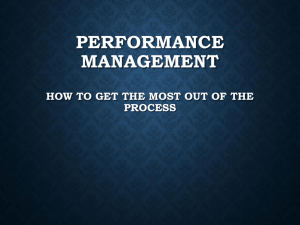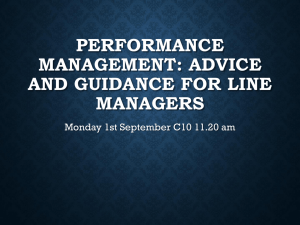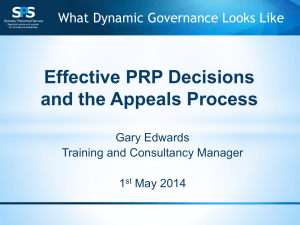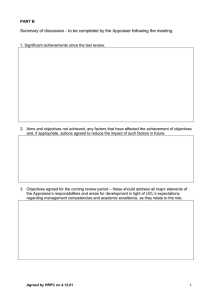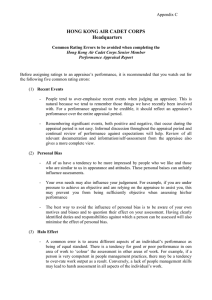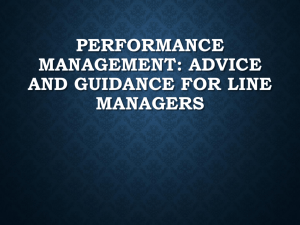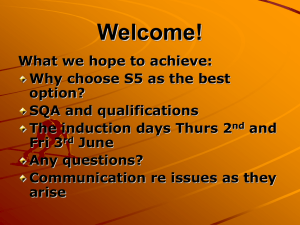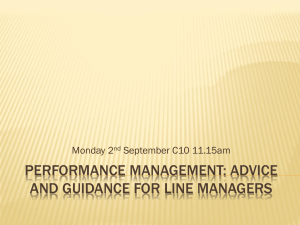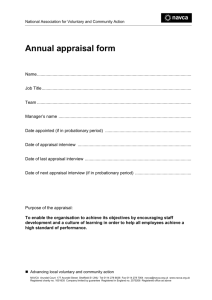Advice to Teachers
advertisement
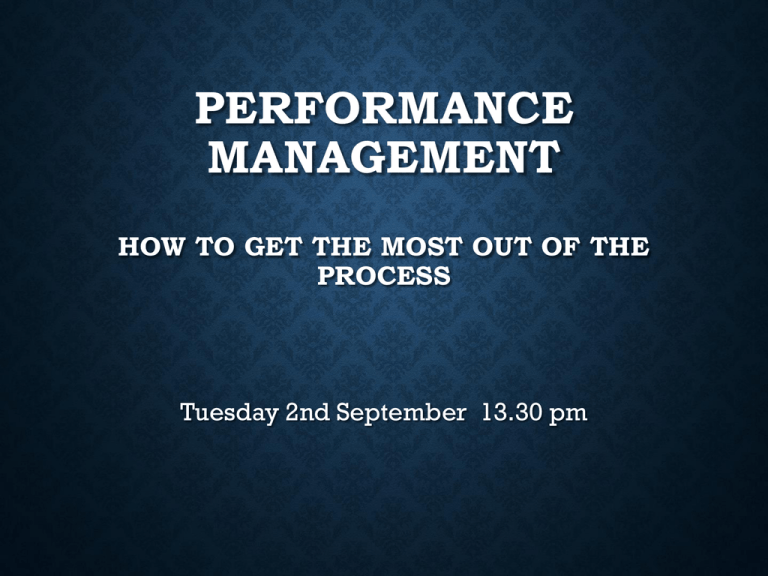
PERFORMANCE MANAGEMENT HOW TO GET THE MOST OUT OF THE PROCESS Tuesday 2nd September 13.30 pm THE PURPOSE OF APPRAISAL • To fulfil a statutory responsibility • Governors are accountable to OFSTED for the appraisal process and annual pay progression results • School improvement and raising standards • Value for money use of public funds • Personal professional development • Managing teacher performance • To make an assessment of a teacher’s overall performance for the year, which make have an effect on any pay award HOW DOES THIS AFFECT MY APPRAISAL? • You will still be assessed against three criteria: 1. Your performance, values, behaviours and conduct and how they compare with the Teachers’ Standards 2. Your role in school 3. Whether you have achieved your performance management objectives IMPLICATIONS: WHAT HAPPENS IF I FAIL TO MEET MY PERFORMANCE CRITERIA? • Between MPS1 and 6, it would mean that you would not get that pay progression for that year • However, once you have gone through threshold, there is a requirement that you have to maintain the performance expected at that level of additional salary • If, over a period of time, your performance had dipped and not recovered, it would lead to the capability procedure WHAT DO I NEED TO KNOW AND DO? • Check both the pay policy and performance management policy • Become familiar with the Standards and make sure you understand them • Look at the Standards Audit that is appropriate for your current/potential level of pay together with your line manager (see p8-15). Completing the Audit could help you both to identify areas of strength and personal areas for development • Have evidence ready to show what you have done and the impact you have had WHAT DO I NEED TO KNOW AND DO? • Use the guidance sheets of for each of the 8 Teacher Standards to help you and your line manager to agree evidence that you are going to use to help demonstrate that you are meeting/have met your objective(s) (see Notrenet) • Check and discuss your role with your line manager annually, using your job description • Make sure you know your current pay point and whether you are eligible for pay progression. Discuss this with your line manager. PERFORMANCE MANAGEMENT MEETINGS • It is the responsibility of your line manager to know how well you are doing throughout the year and to provide support/advice if you may be at risk of not meeting any of the three aspects of your work that will be assessed: • Your performance and conduct in relation to the Teachers’ Standards • Your role • Your performance objectives PERFORMANCE MANAGEMENT MEETINGS • Therefore (s)he will meet you several times during the year to check that you are on track and to acknowledge and celebrate your effort and successes SETTING APPROPRIATE AND EFFECTIVE OBJECTIVES • Objectives should: • be SMART – specific, measurable, achievable, realistic, time-bound • have sufficient challenge for the appraisee • contribute to overall or specific school improvement • complement and develop the appraisee’s skills, knowledge, experience or effectiveness SETTING APPROPRIATE AND EFFECTIVE OBJECTIVES • be related to the appraisee’s role and accountabilities • be related to the appraisee’s teacher standards • be assessable • Is professional development is required for the objective to be achieved? If so…………………. ASSESSING AND MONITORING PERFORMANCE • Success Criteria: • What will a successful outcome to the objective look like? • The actions needed to achieve a successful outcome become the success criteria • Monitoring arrangements and evidence: • You should then be able to identify the actions (you need to take) and related dates for you both to monitor and review progress AN OBJECTIVE FOR ALL TEACHERS THIS YEAR • Objective 1: (see p5) • Implement strategies to improve the performance of pupil premium pupils (or other groups of underperforming pupils, e.g. at KS5) so that they make the expected progression in line with career progression criteria. WHAT WILL SUCCESS LOOK LIKE, WHAT MONITORING SHOULD BE DONE AND WHAT EVIDENCE SHOULD BE GATHERED? • Success Criteria: • Effective plans are in place to support those not making the expected levels of progress • Pupil progress: e.g. “By the end of Key Stage (KS)…, most students achieve in line with school expectations and…”* • Quality of teaching* • *differentiated outcome according to career stage (see p20) WHAT WILL SUCCESS LOOK LIKE, WHAT MONITORING SHOULD BE DONE AND WHAT EVIDENCE SHOULD BE GATHERED? • Monitoring arrangements and evidence: • Evidence you have agreed and gathered to demonstrate intervention • Progress data in SIRA to show the progress that pupils are making • End of year exam/assessment results • Scrutiny of work to show: assessment feedback is identifying areas for improvement; evidence this feedback is being acted upon; literacy marking guidelines are being used consistently and regularly • Lesson observation(s) to show that pupils are making effective progress • Pupil/parent feedback • Advice (specific to this objective): • The use of work record cards will enable the appraiser to see that each student has reflected on the feedback, sought to demonstrate that (s)he understands the feedback (by writing down their own target for improvement). They could also incorporate a way to show that the teacher has monitored that the student has acted on the advice. • The most effective feedback is often two-way, i.e. a dialogue between the teacher and student. Learning conversations can be one way in which both teacher and student can demonstrate understanding of the current performance of the student and what (s)he needs to do to improve. AND FINALLY… • You will find this power point and all the other information and guidance* you need in the staff section of Notrenet • * including: the Professional Standards for Teachers, NDHS PM Objectives 2014, Annual Review Meeting, CPD relevant to PM, Self Evaluation Audits, Guidance on Evidence to Meet the 8 Standards and FAQs • The relevant school policies on pay and performance management can be found in the School Policy Folder (see Cornerstone for the link)
